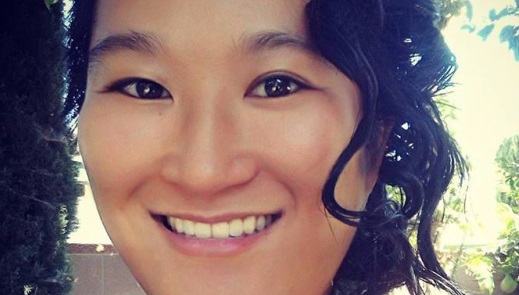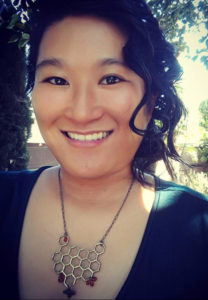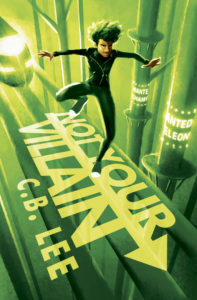CB Lee is the author of several YA novels, including Seven Tears at High Tide, and the Sidekick Squad Series Not Your Sidekick (No. 1), and Not Your Villain (No. 2). She is interviewed here by APALA member Deborah Caldwell. Her works are available through Amazon, your local bookstore, or your local library.
Deborah Caldwell (DC): Please introduce yourself and briefly describe your literary work and career path to date.
CB Lee (CL): Hello, I’m CB Lee. My first novel, Seven Tears at High Tide, a fantasy romance, was published in 2015 with Duet Books, the young adult imprint of Interlude Press. My novel Not Your Sidekick was published in 2016 and the second book in the series, Not Your Villain, was published in 2017. Not Your Sidekick is a 2017 Lambda Literary Awards Finalist and a Bisexual Book Awards Finalist, and Seven Tears at High Tide was a recipient of a Rainbow Award and was a 2016 Bisexual Book Awards Finalist.
DC: There were so many little moments in Not Your Sidekick that I loved, where the authenticity of your experiences really shone through. One moment that particularly stood out to me was when Jess orders food and has to repeat the order in English. That embarrassment at being judged for not speaking your parents’ mother tongue fluently, or for having an accent because you didn’t grow up in a place where you could be immersed in it, really hit me as something I don’t see represented very often. Did you draw from personal experience in this scene, and are there other similar moments you’d like to talk about?
CB: Absolutely. That scene was directly influenced by many of my own experiences trying to order food and having to repeat myself, or when people automatically assume that you don’t speak the language because of your age or how you look. It’s definitely a liminal space that I wanted to show, because so many people experience this, especially first and second generation kids, mixed-race kids, and anyone growing up with more than one culture.
I think it’s very validating to see something you thought only you experienced as something known. I grew up thinking I was both too Asian or too American, or not enough of one, or too much of one or the other. Being Chinese and Vietnamese, I felt a huge disconnect in terms of how much of both languages I’m able to speak. My mom’s family lives nearby, so growing up I used Chinese a lot more to talk with my grandma and other relatives, but I didn’t meet a lot of my dad’s extended family until we went back to Vietnam to visit them. That experience itself, travelling in China and Vietnam, was really eye-opening too, even more so than how I see other people in the community treating kids, because it felt really obvious that I was a foreigner and didn’t belong; everywhere I went I felt very conscious that even though I might share some physical features, everyone could look at me and tell, like if I stopped by a store they automatically switched to English because they assumed I didn’t understand.
The scene where Jess orders food and has to repeat it in English—this exact same thing has happened to me so many times. A lot of the time I just give up and use English anyways, and I feel like there’s just a cycle of being ashamed of my accent and clumsy use of the language, so I don’t practice it and I don’t get better. One of my goals in the next few years is to talk a lot more and learn not only more of the language, but feel more comfortable using it conversationally.
DC: You speak in other interviews and on social media about the importance of representation of not just Asian and queer characters as separate components but also specifically queer Asian characters. Can you talk a bit about your experience navigating queerness as an Asian American woman?
CB: Growing up, my parents never had “the talk” with me about any sort of sexuality or romantic relationships, so I only knew and understood about what I read about in books and saw in TV and movies and such. They were pretty strict as far as social relationships, and one of the reasons I was really involved in extracurricular activities in high school was that they were “approved” social gatherings, so I could go out and hang out with my friends, even if it was just playing tennis or doing volunteer work or whatever.
I couldn’t imagine just talking conversationally with my parents about crushes or anything–we weren’t close in that way. I just had a conversation on the podcast They Call Us Bruce with Phil Yu and Jeff Yang, and one of the things we talked about was about this thing in Asian American families. I think it’s hard to open up about emotional intimacy in our culture, and how that affects youth as they begin to navigate relationships and romance. Going into college, I felt quite naïve about many things, especially as I was really insecure about who I was.
As a teen, I had a lot of attraction towards other girls that I just figured was feelings of friendship that I didn’t really understand. I didn’t really see many bisexual characters growing up, let alone an Asian American one. I didn’t think I was a lesbian because I was also attracted to guys, and I thought all these other feelings I had were broken and wrong.
It wasn’t until my twenties when I figured out that I was attracted to more than one gender and that it was a normal, valid thing. In my writing, I want people to be able to not only enjoy a fun story, but I also want people to be able to see themselves and to see others who aren’t like them, because that’s a powerful thing, to be able to be present and visible.
Often times I feel like it’s easy for people to just think of identity as this one, singular thing, but it’s really the intersection of multiple experiences and communities, and everyone is different. People of color in the queer community have specific experiences and stories that are unique to them, and I hope as more writers and readers start to create and consume more stories that we will be able to see these intersectional experiences.
DC: What drew you to YA as a genre, and do you intend to stick with YA in the future?
CB: I love writing for young adults. I think so many people can relate, because it’s this amazing time where people are learning about themselves, being exploratory, figuring out who they want to be.
I feel like a lot of people look down on young adult novels and that it’s not “literature,” simply because it’s aimed at teenagers. There’s a lot of that in society that tends to take something that young people enjoy and disregard it simply because it’s for that age group, like “oh, it’s not serious, it’s for children,” like there can’t be value in it. But I love the young adult genre simply because there is so much value in teenagers finding themselves and reading stories about other teenagers and wanting and hoping for stories of their own, finding joy in these characters and drawing parallels from them, experiencing wonderful and fantastic things.
I find the challenges addressed in these works have so much meaning. I think there’s definitely a need for more LGBTQIA+ protagonists for teens to see themselves in. As for sub-genres, my favorite thing is adding elements of fantasy or science fiction to a story, because there’s just so much potential.
DC: It’s so refreshing to have a superhero book where the mutant powers aren’t only metaphors for real life issues. What drew you to the superhero/mutant genre and this specific way of flipping that powers-as-metaphor-for-oppressed-identity?
CB: I’ve always loved superheroes and their stories because not only were they larger than life, they also tackled a lot of great issues about identity and who you are, through the lens of having powers (or not) and trying to do good. The X-Men series also very early on tackled a lot of issues about people who were different and just were that way and were fighting for acceptance in their world. There’s a very poignant scene that was brought to life beautifully in the 2000 movie, when Bobby tells his parents he’s a mutant for the first time. His mother responds with, “Have you tried… not being a mutant?”
It was such a parallel to coming out and it resonated with me so much, and many comic books and fantastic media were able to interpret issues and draw parallels to them to the time. I think what draws people to these superhero characters is that they’re larger than life but at the same time have human flaws and are relatable as people. Some more of my favorite comic heroes growing up were the Teen Titans– Robin, Beast Boy, Raven, Cyborg and Starfire. I loved their dynamic, their teamwork, their friendship and how they worked together to fight for justice.
I think the fun of superheroes is that they’re inspiring; it’s not really about the powers, but how they use them. The fantastic element is the draw, but what really keeps me writing (and reading) about superheroes are the characters themselves and their journeys.
DC: Not Your Villain focuses on one of Jess’ friends, Bells, a trans man of color. What has your research process been like as you write from his point of view?
CB: In doing research, I’ve talked with multiple people in the trans community and also in the black community about his character, so I could take care to portray him as respectfully and thoughtfully as I could. I had beta readers read earlier drafts of the work and took into account their feedback during the writing process.
DC: What advice would you give young professionals, especially those from diverse backgrounds, who are interested in a career in writing?
CB: Don’t give up. I think practice and determination are two of the best things to keep in mind if you are interested in pursuing a career in writing. I think practicing by doing is the best way to learn, reading others’ work and trying their hand at it. Striving to do one’s best is and not giving up is an important skill for not just writing but many traits in life, but I think it is particularly important to keep going. It’s a road with a lot of discouragements, so definitely the ability to keep going and pursuing that dream is so important.
DC: Is there anything you wish people would ask you about in interviews but never do?
CB: No one ever has asked me about my favorite kind of socks. They’re all bright colors and fuzzy. Thank you so much for having me!
Editing assistance provided by Molly Higgins.




